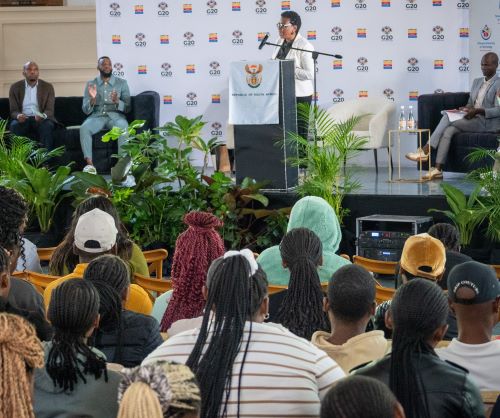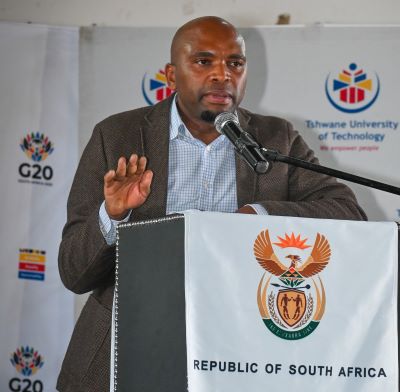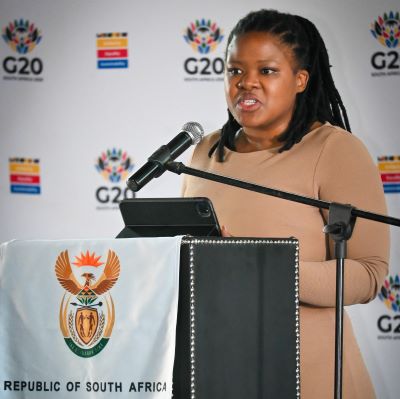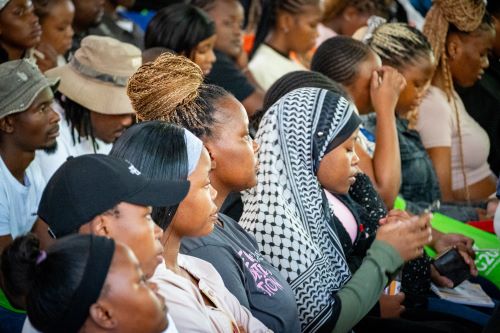By Lerato Motsisi
In a powerful display of civic engagement and knowledge-sharing, the Government Communication and Information System (GCIS), in collaboration with the Department of Public Management at the Tshwane University of Technology’s (TUT) Faculty of Humanities, recently hosted an insightful public lecture on South Africa’s important role as G20 President. Held at the Student Centre on TUT’s Soshanguve Campus, the event formed part of a broader national outreach comprising 51 engagements across the country, aimed at demystifying South Africa’s G20 Presidency and its far-reaching implications.
The public lecture marked the third in a series and coincided with preparations for the G20 Summit, at which South Africa will officially hand over the Presidency to the United States in November 2025. As the host of this prestigious international forum, South Africa has embraced a theme of profound relevance “Advancing Solidarity, Equality, and Sustainability.”
Strengthening public understanding
Opening the event, Dr Jeanette Ramollo, Acting Assistant Dean of the Faculty of Humanities, emphasised the significance of the public discourse. “As part of the government’s initiative to explain why South Africa is hosting the G20 Summit in November, TUT is honoured to host this lecture, where the Deputy Minister will elaborate on our country's leadership role in the G20. We also anticipate gaining deeper insights into how the nation and its people stand to benefit from hosting this high-level gathering,” she said.

Dr Jeanette Ramollo, Acting Assistant Dean of the Faculty of Humanities delivering the opening address.
The lecture provided a valuable platform for Public Affairs students to engage with senior government officials and gain a clearer understanding of South Africa's global responsibilities. With their mandate to drive knowledge production and policy influence, students from the Department of Public Management were well-positioned to take part in the high-level dialogue.
Next up, Sandile Nene, Deputy Director-General of Content Processing at GCIS, outlined the agency’s role in supporting public awareness of the G20 and ensuring broad-based national participation. He highlighted that the series of lectures and engagements is designed to bring the benefits of the G20 home to South Africans by connecting global policymaking to local development needs. These include promoting trade and tourism, attracting investment and addressing long-standing socio-economic challenges.

Sandile Nene, Deputy Director-General of Content Processing at GCIS
Vision for inclusive global leadership
Delivering the keynote address, Deputy Minister in the Presidency, Ms Nonceba Mhlauli, offered a compelling overview of South Africa’s G20 leadership and its impact on the lives of ordinary citizens. She began by contextualising the G20 as a global forum that shapes key policy directions on economic governance, financial stability, climate change and sustainable development.
“The G20 plays a vital role in guiding global economic discourse. As chair, South Africa has a unique opportunity to influence the international agenda in a way that uplifts our country and the entire African continent,” Mhlauli said. “We aim to use this platform to promote inclusive growth, enhance cooperation among nations, find common solutions to complex global challenges.”
Her remarks underscored the transformative potential of South Africa’s G20 Presidency. In particular, she stressed the importance of using this leadership moment to catalyse efforts in critical areas such as food security, gender equality, youth empowerment, job creation through digital transformation and environmental protection.

Deputy Minister in the Presidency, Ms Nonceba Mhlauli
A real-world classroom for aspiring leaders
For TUT students, the lecture went beyond theoretical engagement. Mhlauli described the G20 as “a living case study of multilateral cooperation, economic diplomacy and governance in action,” offering future public servants and policymakers an opportunity to witness international policy-making first-hand.
“The G20 offers critical insights into how nations collaborate to address global crises. For students, it provides a front-row seat to the workings of international diplomacy and a deeper understanding of how ethical and inclusive governance can shape a more equitable world order,” she added.
She also shared updates on President Cyril Ramaphosa’s working visit to the United States, emphasizing its importance in countering misinformation, strengthening bilateral relations, and ensuring a seamless transition of the G20 Presidency. This diplomatic effort reinforces South Africa's commitment to international cooperation and continuity.
Student engagement and civic reflection
The event concluded with a robust question-and-answer session during which students posed thoughtful queries to both Ms Mhlauli and Mr Nene. The discussion reflected the audience’s keen interest in how South Africa’s G20 engagement would translate into tangible improvements in their lives - especially in education, employment, and international exposure.
The public lecture served both as an educational forum as well as a call to action for students, academics and citizens to actively participate in shaping the country's global narrative. As South Africa navigates its role as G20 President, the nation’s youth - and institutions like TUT - stand at the forefront of shaping a future anchored in solidarity, equality and sustainable development.
This moment in history provides an exceptional opportunity for South Africa to showcase its leadership on the world stage while ensuring that its people, especially the next generation, are informed, inspired and included in the global conversation.

Public Affairs and Journalism students attending the G20 Presidency public lecture.
